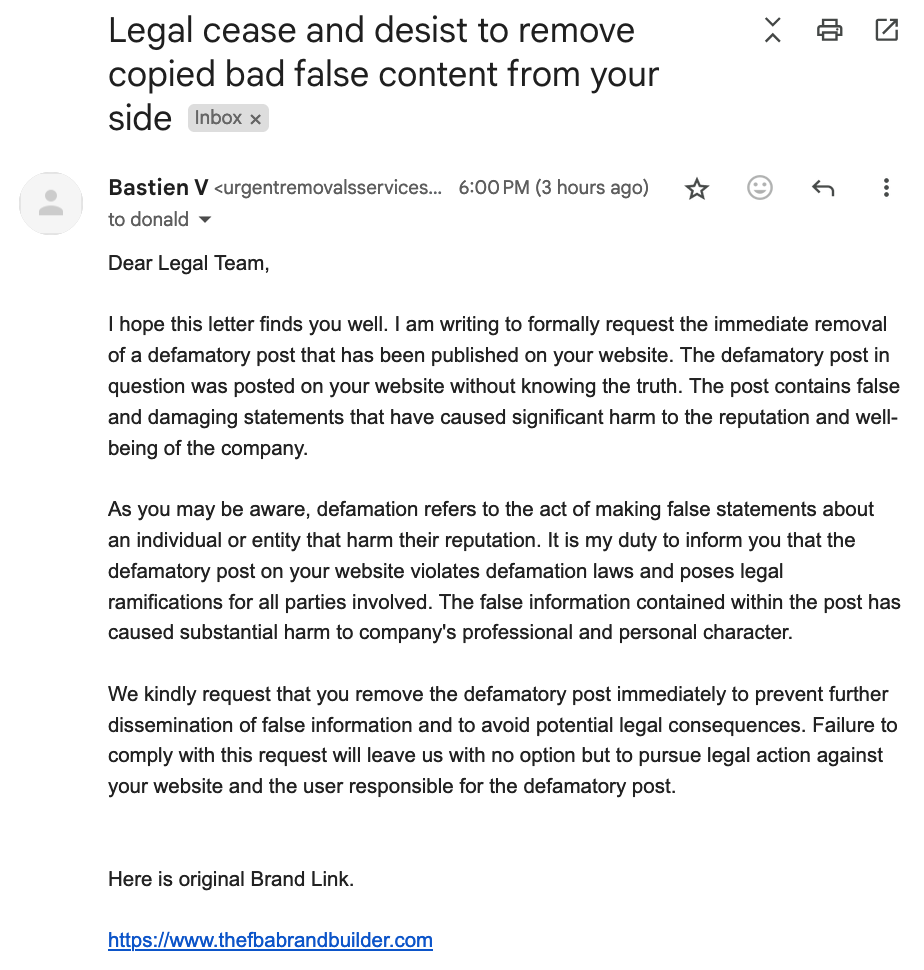Darren Campbell, founder of The FBA Brand Builder, has made a name for himself promoting Amazon mentorship and helping people build successful brands. But his latest move to protect his company’s image is raising some eyebrows—and not in a good way. Instead of addressing criticism head-on, it appears Darren is taking the cheapest possible route to try and scrub critical content from the web. How? By hiring a $10 freelancer to send a DMCA takedown notice to a site that shared unflattering information about him and his program.
If this sounds like an unusual approach for someone who claims to run the “Ferrari of Amazon mentorship programs,” you’re not alone in thinking so.

The $10 Takedown Attempt
Darren (or someone acting on his behalf) recently engaged a freelancer from Pakistan named Ashiq Ahmed to send a takedown notice to a website critical of The FBA Brand Builder. Ashiq, whose profile on the freelancing platform Kwork advertises “professional DMCA takedown” services for just $10, offers to send notices to platforms like Google, Instagram, Amazon, and more. According to his Kwork profile, Ashiq promises a “strong and professional” DMCA notice that he claims can help clients remove unwanted content quickly and cheaply.
Let’s be real—$10 doesn’t buy you a high-powered legal team. But it’s enough for a basic DMCA notice, which can sometimes get website owners to take down content without question. For businesses, it’s a quick and dirty way to try to silence critics, especially if they’re unwilling to invest in a proper legal response or open dialogue. And in this case, Darren’s choice to go with a budget freelancer for this purpose speaks volumes.

What’s in the Takedown Notice?
The email sent by Ashiq, supposedly on behalf of Darren, is a mix of legal jargon and strong language about “defamation” and “significant harm.” The notice demands the removal of “false and damaging statements” from a website that critiques The FBA Brand Builder. Here’s an excerpt from the email:
“The defamatory post on your website violates defamation laws and poses legal ramifications for all parties involved... We kindly request that you remove the defamatory post immediately to prevent further dissemination of false information and to avoid potential legal consequences.”
But here’s the kicker: the DMCA is intended to handle copyright infringement, not defamation. If Darren truly felt defamed, he’d need to go through the proper legal channels, which require proving the information is false and damaging. But that process takes time, money, and actual legal representation—not a $10 freelancer who specializes in takedown requests.
By mixing defamation claims with a DMCA request, the notice looks more like an attempt to intimidate the site into taking down content that Darren simply doesn’t like. It’s a classic example of “DMCA abuse,” where copyright law is used (or misused) to try to silence unfavorable opinions rather than address actual copyright infringement.
Cutting Corners to Control the Narrative
The irony here is hard to miss. Darren often speaks about “going all in” and “doing the work” when it comes to building a business. He frequently emphasizes quality and encourages his followers to invest in their success. Yet, when faced with negative publicity, it seems he’s willing to take the absolute cheapest approach possible—one that sidesteps real dialogue or accountability. Rather than hiring an actual legal professional or addressing the criticisms directly, Darren is opting for a quick, low-cost way to “reclaim his content” through a freelancer known for DMCA requests.
The message this sends isn’t exactly inspiring. For someone who wants to be seen as a top-tier mentor, taking a shortcut to remove content rather than engaging with it in a transparent way feels contradictory. It also raises questions: If Darren is so confident in his program’s quality, why go to such lengths to hide critical voices?
A Band-Aid for Deeper Issues?
The fact that Darren opted for a $10 takedown notice instead of a more professional response suggests that this may not be about protecting intellectual property at all. Instead, it seems to be a tactic to avoid the hassle of addressing critiques. But in the age of information, trying to silence critics this way rarely goes unnoticed—and it often backfires. Instead of eliminating criticism, it highlights it, making people more curious about what the takedown notice is trying to suppress.
For potential clients of The FBA Brand Builder, this approach could be a red flag. Darren’s decision to take the cheapest possible route to “protect” his reputation suggests a lack of willingness to engage with genuine concerns or answer tough questions. If he’s willing to spend only $10 to deal with a critical website, one has to wonder how committed he really is to quality and transparency across the board.
Why It Matters: Transparency Builds Trust
In the world of business coaching, transparency is everything. Success stories are powerful, but they need to be genuine and backed by integrity. If Darren’s response to criticism is to throw a few dollars at a freelancer to send a takedown notice, it’s hard not to question the depth of his commitment to honesty and quality. His followers and clients deserve to know that their mentor values accountability, especially when it comes to his own business practices.
For those considering investing in The FBA Brand Builder, this situation might prompt a closer look at Darren’s approach to business. Real success isn’t just about glossy testimonials and motivational emails—it’s about standing behind your brand, even when things get tough, and addressing concerns openly.
Final Thoughts: The True Cost of Cutting Corners
Darren Campbell’s choice to use a $10 DMCA notice to address criticism reflects a broader issue: the willingness to cut corners to maintain control of the narrative. In the long run, this cheap, shortcut-driven approach could harm the trust he’s worked to build with his clients. Instead of tackling concerns in a way that encourages discussion and transparency, Darren is opting for a method that feels, frankly, dismissive.
In business, and especially in mentorship, reputation is everything. Taking the cheapest route may seem like a quick fix, but it rarely leads to lasting credibility. For a brand that prides itself on being the “Ferrari” of Amazon mentorship programs, it’s worth asking: Is this really how a top-tier business handles criticism?

